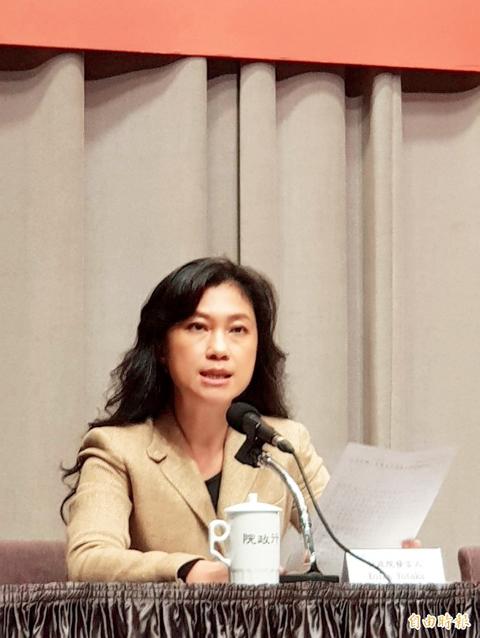Premier Su Tseng-chang (蘇貞昌) yesterday said that he would approve a pilot scheme to offer rent subsidies to single people, newlyweds and families with children younger than 20 who earn less than 2.5 times the government-specified lowest cost of living.
The scheme, aimed at encouraging marriage and childbirth, would benefit 24,000 single men and women, couples or families, Su said while presiding over an Executive Yuan meeting in Taipei.
Applications would be accepted from September, he said.

Photo: Taipei Times
The subsidies would target single men and women between 20 and 40, couples who have been married less than two years and couples with children under the age of 20, Deputy Minister of the Interior Hua Ching-chun (花敬群) told reporters after the meeting.
Under the scheme, which was proposed by the Ministry of the Interior, couples would receive NT$3,000 to NT$5,000 (US$96 to US$160) and individuals would receive NT$2,600 to NT$4,000 in rent subsidies per month depending on the city or county in which they live, he said.
Qualified applicants in Taipei would receive the highest amount, with couples to receive NT$5,000 per month and individuals to receive NT$4,000, he said.
In Taichung, New Taipei City, Taoyuan and Hsinchu, couples and individuals could expect monthly subsidies of NT$4,000 and NT$3,200 respectively; those in Tainan and Kaohsiung would receive NT$3,200 and NT$2,600; and recipients in all other cities and counties could expect NT$3,000 and NT$2,600, he said.
Whereas only individuals who earn less than 1.5 times the lowest cost of living are eligible for an existing rent subsidy scheme, the new scheme would accept applicants who earn less than 2.5 times the lowest cost of living per month per person, he said.
In other terms, families with annual household incomes in the lowest 35th percentile — instead of the lowest 20th percentile — would be eligible, he added.
Using Taipei and New Taipei City as examples, he said that people who earn less than NT$41,450 and NT$36,665 per month on average respectively would be eligible.
Subsidies would be distributed starting in November, he said, adding that the scheme, which is expected to run for one year, would cost about NT$1.1 billion.
The lowest cost of living in Taipei and New Taipei City were set at NT$16,580 and NT$14,666 respectively this year, while the national average — excluding Kinmen and Lienchiang counties — is NT$12,388, according to the Department of Social Assistance and Social Work’s Web site.
Also at the meeting, Minister of the Interior Hsu Kuo-yung (徐國勇) reported on the progress of a plan to build 200,000 social housing units in eight years.
More than 27,000 units have been completed or are under construction, with the number expected to rise to 35,000 by the end of this year and surpass a first-stage target of 40,000 by the end of next year, he said.
Through collaboration with local governments, the central government is confident that it would reach its goal on schedule, he added.

Taiwanese can file complaints with the Tourism Administration to report travel agencies if their activities caused termination of a person’s citizenship, Mainland Affairs Council Minister Chiu Chui-cheng (邱垂正) said yesterday, after a podcaster highlighted a case in which a person’s citizenship was canceled for receiving a single-use Chinese passport to enter Russia. The council is aware of incidents in which people who signed up through Chinese travel agencies for tours of Russia were told they could obtain Russian visas and fast-track border clearance, Chiu told reporters on the sidelines of an event in Taipei. However, the travel agencies actually applied

Japanese footwear brand Onitsuka Tiger today issued a public apology and said it has suspended an employee amid allegations that the staff member discriminated against a Vietnamese customer at its Taipei 101 store. Posting on the social media platform Threads yesterday, a user said that an employee at the store said that “those shoes are very expensive” when her friend, who is a migrant worker from Vietnam, asked for assistance. The employee then ignored her until she asked again, to which she replied: "We don't have a size 37." The post had amassed nearly 26,000 likes and 916 comments as of this

New measures aimed at making Taiwan more attractive to foreign professionals came into effect this month, the National Development Council said yesterday. Among the changes, international students at Taiwanese universities would be able to work in Taiwan without a work permit in the two years after they graduate, explainer materials provided by the council said. In addition, foreign nationals who graduated from one of the world’s top 200 universities within the past five years can also apply for a two-year open work permit. Previously, those graduates would have needed to apply for a work permit using point-based criteria or have a Taiwanese company

The Shilin District Prosecutors’ Office yesterday indicted two Taiwanese and issued a wanted notice for Pete Liu (劉作虎), founder of Shenzhen-based smartphone manufacturer OnePlus Technology Co (萬普拉斯科技), for allegedly contravening the Act Governing Relations Between the People of the Taiwan Area and the Mainland Area (臺灣地區與大陸地區人民關係條例) by poaching 70 engineers in Taiwan. Liu allegedly traveled to Taiwan at the end of 2014 and met with a Taiwanese man surnamed Lin (林) to discuss establishing a mobile software research and development (R&D) team in Taiwan, prosecutors said. Without approval from the government, Lin, following Liu’s instructions, recruited more than 70 software